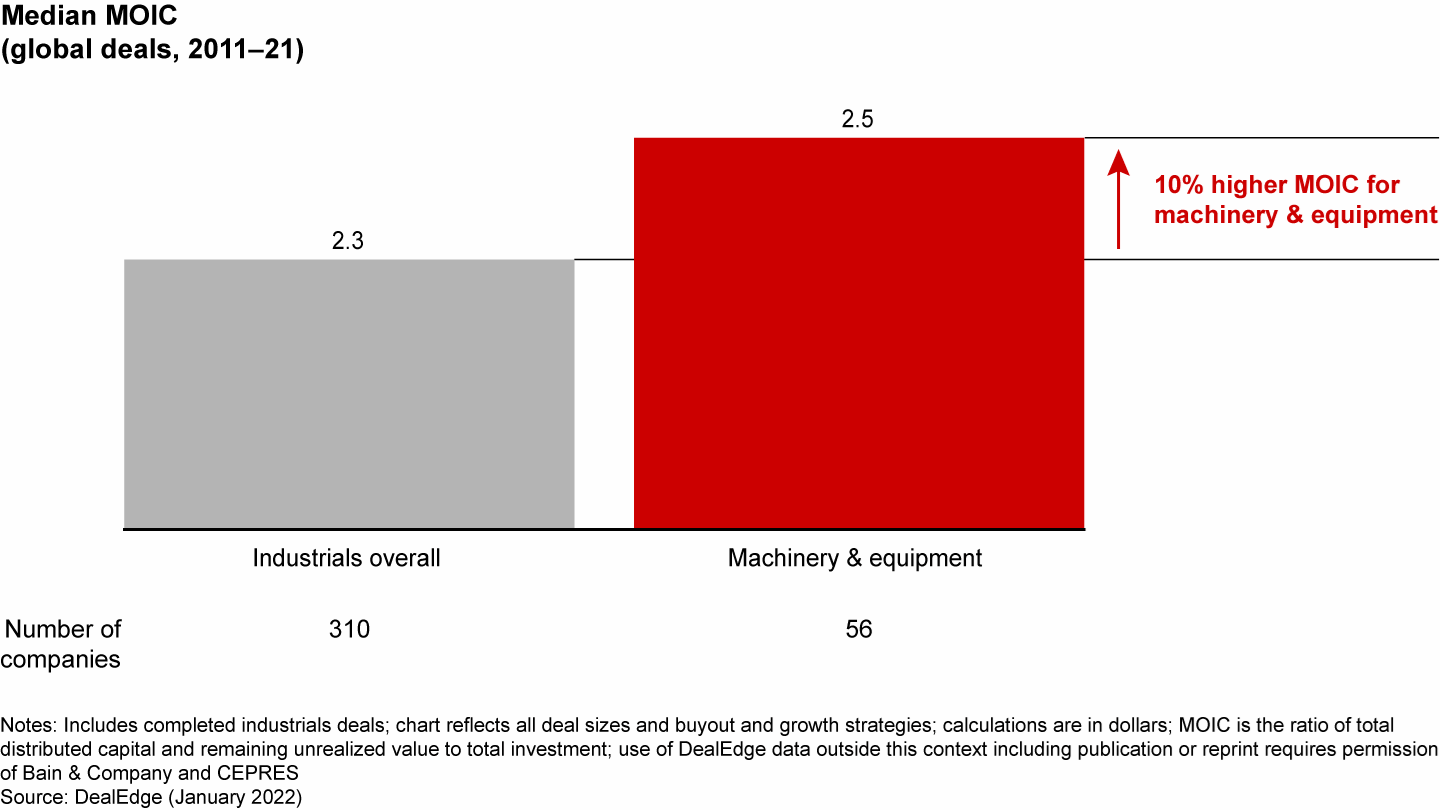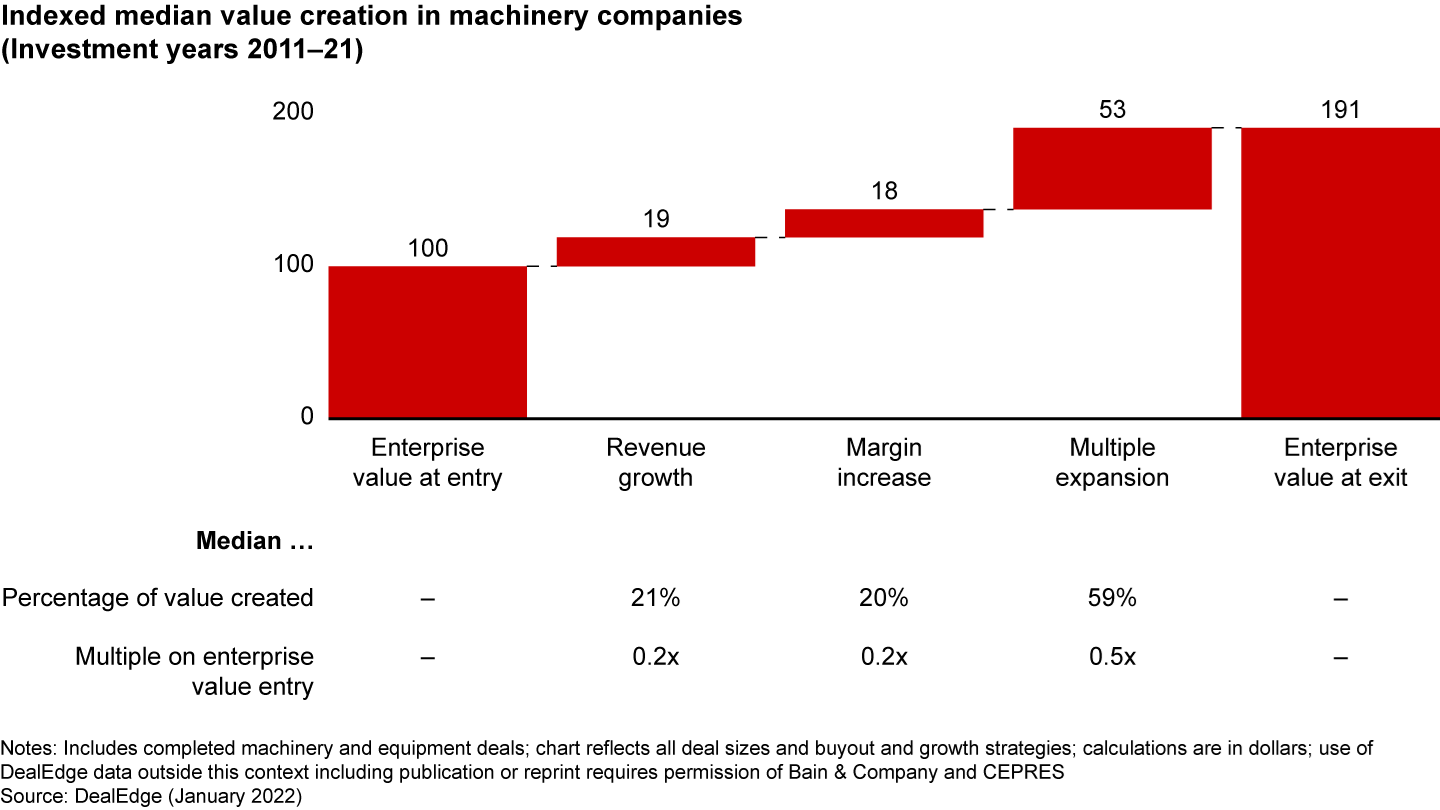Global Machinery & Equipment Report

Executive Summary
- Machinery and equipment deals outperformed the industrials sector as a whole by 10% over the past 10 years.
- The enterprise value for machinery and equipment companies nearly doubled over the past decade.
- Many private equity funds consider ESG and digital transformation to be core elements of a holistic value creation plan.
This article is part of Bain's Global Machinery & Equipment Report 2022
The machinery and equipment sector has been among the most active industrial sectors in global private equity (PE) dealmaking since 2010. Some of the largest industrial deals were in machinery and equipment, including Advent and Cinven’s €17.2 billion ($20.2 billion) purchase of Thyssenkrupp Elevators in 2020.
More important, when it comes to post-acquisition performance, machinery and equipment deals are outperforming those in other industrial sectors. Over the past decade, machinery and equipment deals produced a median multiple on invested capital (MOIC) of 2.5. That measure—the ratio of total distributed capital plus unrealized value to total investment cost—was 10% higher for machinery and equipment deals than for the industrials sector as a whole (see Figure 1).
Machinery and equipment deals delivered a 2.5x median multiple on invested capital (MOIC) over the past 10 years, outperforming the industrials sector


During the same period, the growth in enterprise value for machinery and equipment companies was 1.9 times (see Figure 2). Three key factors contributed to the rise: revenue growth, margin increase, and multiple expansion (which is influenced by top-line and margin growth).
Three key factors fuel value creation in machinery: revenue growth, margin improvement, and multiple expansion


In our experience, top-performing funds take a holistic approach to value creation. That means they look far beyond a company’s cost structure, including general and administrative (G&A) expenses, procurement, and operations, to tap all areas of potential improvement, including commercial excellence, pricing, service excellence, and mergers and acquisitions (M&A).
Winning PE firms also spot opportunities to reposition traditional businesses and benefit from broad trends that are reshaping markets. Key trends affecting machinery and equipment companies include sustainability and the application of new technologies such as sensors and automation to traditional products and processes.
Key interdependencies
Fund managers’ ability to increase a portfolio company’s growth and margins will become more crucial in the years ahead. With multiples near record highs, and economic volatility on the rise, returns for any deal that isn’t supported by business improvement will likely come under pressure.
PE funds that take a holistic approach to value creation are best positioned to deliver robust gains. By integrating strategic and operational assessments, they generate insights and opportunities that a one-dimensional approach cannot. A holistic post-acquisition plan sets up PE investors to succeed by spotting the most viable and realistic path to new value. And in a downturn, when firms can no longer rely on multiple expansion to mask underperformance, that can create an invaluable competitive advantage.
With multiples near record highs, and economic volatility on the rise, returns for any deal that isn’t supported by business improvement will likely come under pressure.
The most successful private equity deals in machinery and equipment over the past decade relied on integrated value creation plans that delivered strong EBITDA growth. From the outset, these leaders built a holistic view of a company’s potential, considering key interdependencies between strategy and operations. Many fund managers still ask, “What level of cost savings can we achieve?” Those that take a holistic approach pose a different question: “How can we sustainably grow the business?”
Consider the example of Triton’s successful transformation of Dematic, a supplier of materials-handling systems, software, and services. At the time of its acquisition in 2006, Dematic was a wholly owned subsidiary of Siemens and was losing €100 million ($126 million) a year. With less than €1 billion ($1.26 billion) in sales, it lacked sufficient size to compete. Triton’s holistic approach to value creation turned the company around and set it on a path to eventually become a global leader in warehouse logistics.
Triton, a PE fund focused on the industrials sector, supported a comprehensive growth and investment plan. While cost-cutting was key to improving profitability, an ambitious growth strategy positioned Dematic to outpace competitors and enter new markets. Importantly, Triton backed Dematic’s investment in proprietary warehousing technology. It also supported a strategic acquisition in the US. Capitalizing on a turnaround that boosted Dematic’s EBITDA to roughly €100 million ($127 million), Triton sold the company in 2012 to AEA Investors for an estimated €700 million to €800 million ($889 million to $1.02 billion). AEA also took a holistic approach as it turned around Dematic’s European operations and positioned the business for the next phase of growth. Four years later, when it sold Dematic in November 2016 for €2.1 billion ($2.32 billion) to Kion Group, the company’s enterprise value had risen to €3.25 billion ($3.58 billion).
Many fund managers still ask, “What level of cost savings can we achieve?” Those that take a holistic approach pose a different question: “How can we sustainably grow the business?”
Value creation: ESG and digital
In addition to conducting diligence in areas that can create significant value such as operational improvement, G&A, commercial excellence, and pricing, PE investors in machinery and equipment often add diligence modules in environmental, social, and governance (ESG) and digital transformation. They know ESG and digital capabilities are becoming vital to a company’s competitiveness. Already, many top-performing funds incorporate ESG and digital assessments into every diligence and value creation plan.
Improving the ESG profile of a company can create value in every industry, including machinery. As a growing number of government authorities and regulators establish minimum ESG requirements, companies that take the ESG lead in their sector are gaining a source of competitive advantage. Seventy percent of global LPs say their organizations’ investment policies include an ESG approach, according to a recent survey by Bain and the Institutional Limited Partners Association.
Industrial companies have a wide range of opportunities to improve their ESG performance, especially in sustainability. These include, for example, more environmentally friendly packaging; decarbonization through the use of renewable energies; reduction and recycling of waste; green construction with energy-efficient heating, ventilation, and air-conditioning systems; reduced water use through leak detection and flow metering; and improved occupational health and well-being, through investments in industrial safety equipment. Combining gains in even a few of these areas can improve environmental performance significantly, enhancing a product’s brand image and attracting new customers.
Carlyle acquired Flender, a German mechanical drive manufacturer, in 2020 for €2 billion ($2.41 billion), eyeing the global shift to a more sustainable energy system. Carlyle’s deal thesis focused on increasing sales of gears for wind turbines as wind energy becomes more cost competitive and pressure mounts to reduce CO2 emissions. Carlyle is already benefiting from lower interest rates on sustainability loans that Flender is issuing to finance its growth.
Digital technologies and data have enabled industrials businesses to dramatically grow their service and aftermarket revenue through advanced services and lower costs. One example is investment in predictive analytics that enable predictive maintenance and capacity optimization. Others include remote monitoring of processes and diagnostic information, remote servicing of connected devices, and data acquisition and integration.
Take the example of Advent’s and Cinven’s purchase of Thyssenkrupp’s elevator business in 2020. Both funds saw growth potential in the unit’s digital platform MAX, a cloud-based real-time monitoring and diagnostic solution for elevators. Thyssenkrupp, which launched MAX in 2015 to predict maintenance issues before they occur, said the service reduces elevator downtime by up to 50%.
The firm’s new private equity owners believed in the firm’s strong digital capabilities and expanded the MAX service offering to all products, including escalators. They supported a major marketing campaign in the US and pushed to increase market share by offering the MAX service package to hospitals for free. The company also adapted MAX to manage Covid-related elevator capacity limits. Recently renamed TK Elevator, the company reported fiscal 2020–21 sales of €8 billion ($9.1 billion), up 4%, and EBITDA of 14%, up more than one percentage point.
Top-performing PE funds have recognized that a holistic value creation plan is the most effective path to improving performance at machinery and equipment companies, particularly in a landscape with high valuations. In the coming years, an integrated approach will be increasingly important to PE fund deal theses. Funds that incorporate not only strategy and operations but elements such as ESG and digital will gain an edge generating growth—and attracting new investors. As a holistic approach becomes the norm instead of the exception, funds that have already gained valuable experience integrating multiple elements into one value creation plan will be out in front.
More from the report
Read our Global Machinery & Equipment Report 2022

DealEdge Data Book: 2021 Private Equity Performance Benchmarks
DealEdge® is the private equity industry’s leading provider of deal-level performance and operational analytics. Get groundbreaking deal-level performance benchmarks, covering IRRs and MOICs, across the PE industrials sector in our latest report. DealEdge’s inaugural Data Book covers 1,000 deals across 105 industrials subsectors, ranging from flexible plastic packaging to electronic components. Download now.